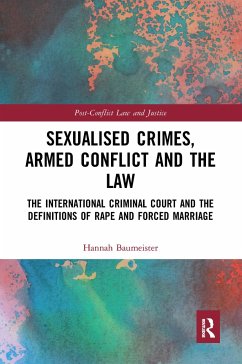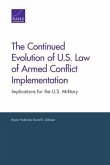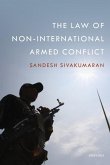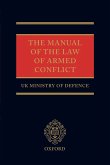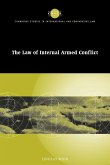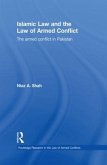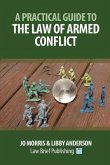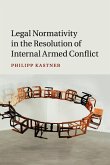From ancient to modern times, sexualised war violence against women was tolerated if not encouraged as a means of reward, propaganda, humiliation, and terror. This was and is in defiance of international laws that have criminalised acts of sexualised war violence since the 18th century. Ad hoc international tribunals have addressed especially war rape since the 15th century. The International Criminal Court (ICC), however, is the first independent, permanent, international criminal court that recognises not only war rape but also sexual slavery and other sexualised crimes as crimes against humanity, war crimes, and acts of genocide in its statute and supporting documents.
This book explores how the ICC definitions of rape and forced marriage came about, and addresses the ongoing challenge of how to define war rape and forced marriage in times of armed conflict in a way that adequately reflects women's experiences, as well as the nature of the crimes. In addition to deepening the understanding of the ICC negotiations of war rape and forced marriage, and of the crimes themselves, this volume highlights relevant factors that need to be considered when criminalising acts of sexualised war violence under international law.
Sexualised Crimes, Armed Conflict and the Law draws on feminist and constructivist theories and offers a comprehensive theoretical and empirical examination of the definition of rape and forced marriage. It presents the latest state of knowledge on the topic and will be of interest to researchers, academics, policymakers, officials and intergovernmental organisations, and students in the fields of post-conflict law and justice, international law, human rights law, international relations, gender studies, politics, and criminology.
This book explores how the ICC definitions of rape and forced marriage came about, and addresses the ongoing challenge of how to define war rape and forced marriage in times of armed conflict in a way that adequately reflects women's experiences, as well as the nature of the crimes. In addition to deepening the understanding of the ICC negotiations of war rape and forced marriage, and of the crimes themselves, this volume highlights relevant factors that need to be considered when criminalising acts of sexualised war violence under international law.
Sexualised Crimes, Armed Conflict and the Law draws on feminist and constructivist theories and offers a comprehensive theoretical and empirical examination of the definition of rape and forced marriage. It presents the latest state of knowledge on the topic and will be of interest to researchers, academics, policymakers, officials and intergovernmental organisations, and students in the fields of post-conflict law and justice, international law, human rights law, international relations, gender studies, politics, and criminology.

